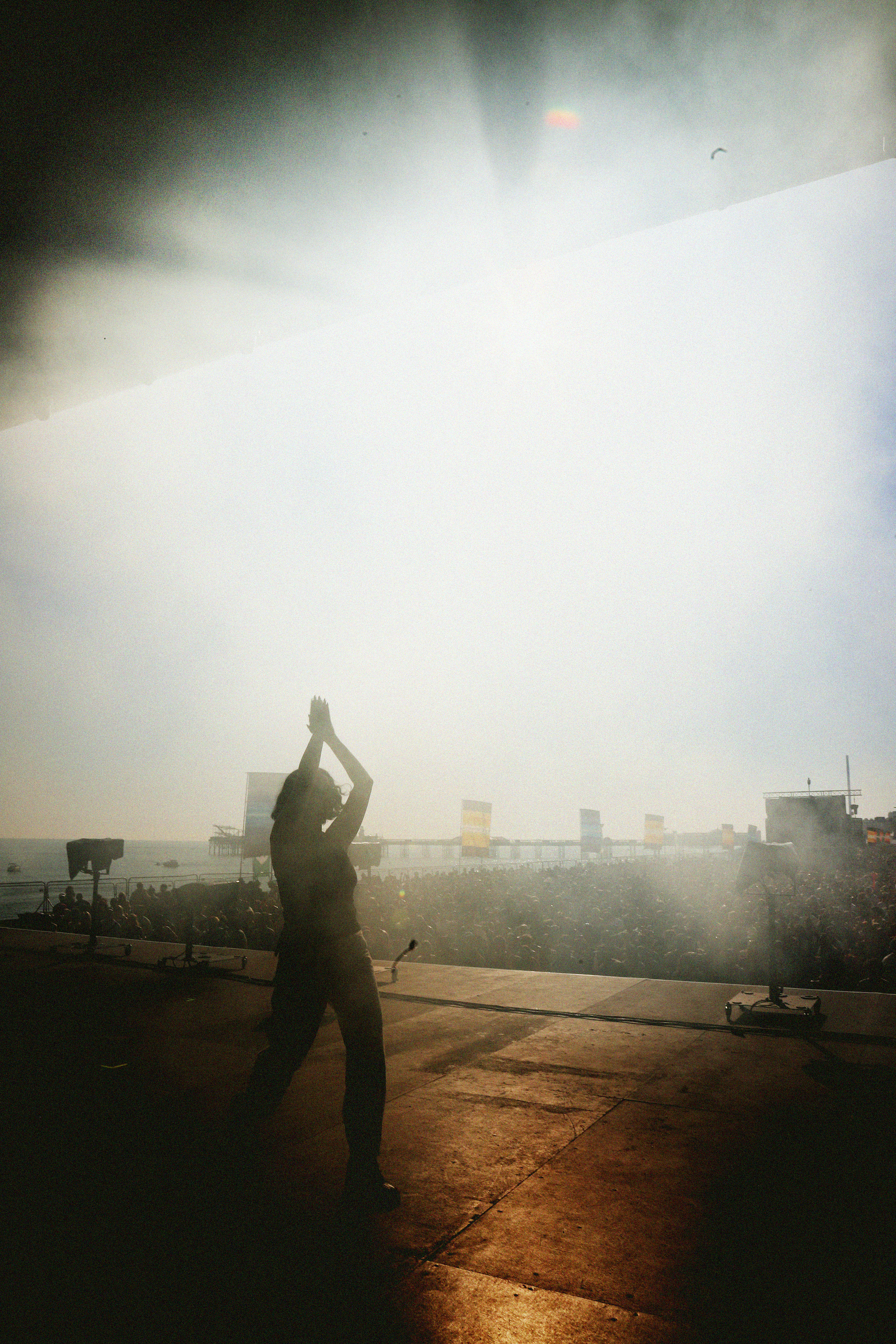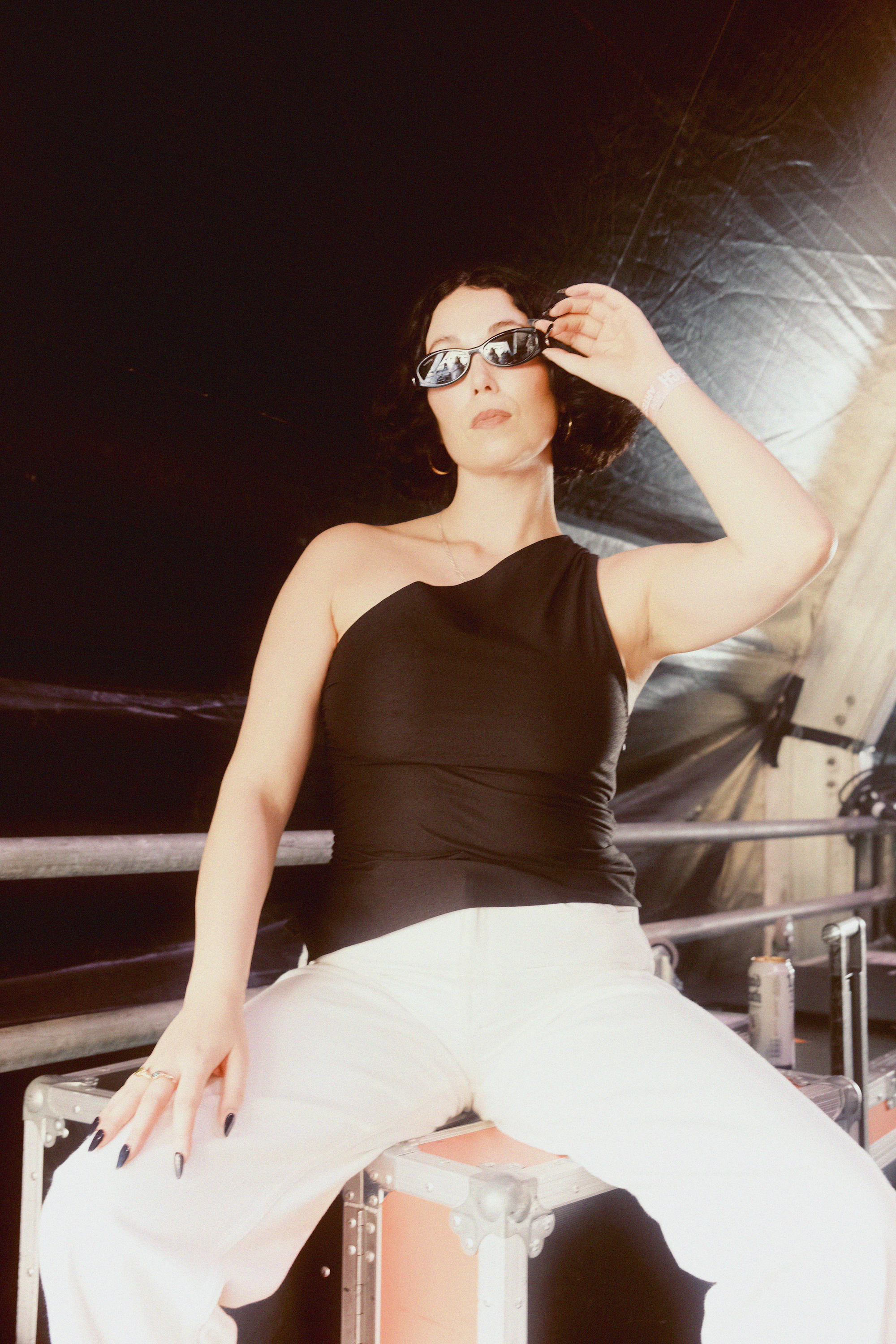Kelly Lee Owens Is For the Working-Class Dreamers
August 5, 2024People are crammed into Phonox in Brixton, a sticky black box of a room, because they want to escape.
The dance floor is filled with excitable teenagers dressed like Charli XCX “brat summer” edition (big hair, black cycling sunglasses, miniskirts from the 2000s) and lined with middle-aged techno fans providing stoic encouragement for what has to be some of these kids’ first real club experiences. It’s the July 2024 launch party of Dirty Hit’s new electronic music imprint, dh2, created by The 1975’s George Daniel. Kelly Lee Owens, the first-ever artist to release on dh2, bounces out from the side door onto the decks. We see only her sunglasses, a joyous grin, and a triangle bob that defies gravity, as she dances her way through a playful set. Daniel and his fiancé—the real Charli XCX—dance and film on their phones behind her.
People at the event—some older fans of hers, many undoubtedly new by way of the George and Charli connection—already know the words to her pulsating and addictive lead single, “Love You Got.” It only dropped a few hours ago. Though Owens’ mix blends other people’s songs with her own, the set feels like an introduction to the philosophy of Dreamstate, her new electronic album. Its euphoric choruses, spiritual overtones, and mantra-like lyrics initiate listeners into a two-step program: release control over the events of your life and then dream bigger for yourself.
For Owens, it was a nerve-wracking experience to publicly welcome in the next more visible, supercharged era of her career. “A lot of people think they can DJ but it’s hard and really scary to put yourself up there. It’s just you alone with nothing to hide behind,” Owens tells me a week later from her flat in London. “You’re commanding a space with so many tracks. You’re making decisions every few seconds for an hour or two.”
Since the launch, she has played in North Wales at a venue near her hometown, for an event she put on with Dan Snaith aka Caribou (artists usually play only South Wales, and she’s sick of the cultural neglect) and Ibiza twice, for her own set and to support Charli XCX for one of her PARTYGIRL club nights. The latter support slot makes sense. A rare venerated woman in techno, Owens’ music is probably best described as techno for pop fans.
She was originally an indie music lover who fell in love with the “humanity” of analogue synths by accident, the first time she heard them being used in a studio. “If you don’t put your soul into it, there won’t be any soul—they’re an extension of yourself,” she says. That philosophy extends to her own etheric songs which are made intuitively, rather than using any specific technical training or overt planning. “Dance music is hypnotic and there’s something about it which feels primal, something you can’t put into words—and I’m glad because I don’t want to. We shouldn’t be able to explain away everything.”

Her sunny, unpretentious attitude onstage has the intended effect of “holding space” for audiences, allowing them to feel present and unselfconscious. It didn’t always feel easy to perform in this way. “I dived headfirst straight into this underground DJ culture coming from Wales not really understanding what the silent rules are,” she explains. “Don’t be provocative. Dress a certain way. Stay behind the decks. You can’t be a pop star and a DJ. I have hang-ups that relate to that because I wanted to be taken seriously. And now I know I can do what I want. I’ve earned my stripes. I want to enjoy it.”
As a teenager, she worked as a nurse, an avenue suggested by a careers advisor after Owens said that she wanted to care for and connect with people. It was only later she was encouraged to follow her dreams by the patients at the cancer hospital she worked at. One of them was a psychic-medium who told Owens that she would move to London that May and that she could see her singing and on stage. “I hadn’t spoken to this lady at that point but she started our conversation with, ‘You know this job is just a stepping stone for you, don’t you?’” Owens remembers, adding that that May she was offered a full-time job in a record store in London during the recession of 2009. Other patients encouraged her indirectly by telling her their personal regrets. “It was always the things they didn’t try and didn’t say—not being bold enough or brave enough to try things and fail.” She considers it the greatest gift she could have been given at only 18 to have a daily intimate audience with such vulnerable and wise people.
When she first moved to London in 2009, the capital city was a different place, with the capacity to bend to the will of a punk spirit and to house independent spaces. The event horizon of its sanitization was still a few years off. It felt somewhat possible for someone with no money to start a club night or a successful DIY project. “A pivotal moment for me was when Fabric was threatened to close,” she says, putting a pin for this cultural decline in 2016. “Between the housing industries, local councils, and people moving into London next door to a club and then complaining about noise, it was a shift into not valuing the culture, not caring about the culture, not wanting to know why this area is cool or popular.” The fact that people did protest the closure of such a necessary institution and get it reopened in 2017 was heartening and something Owens believes we should remember. “If you’re a music fan and lover, we have to fight to keep dance spaces open—even just for other people. It’s about the wider community.”
To have a mix of trusted venues and more ephemeral spaces means that no matter who you are in a city, whether you’re older without an available crew of friends or new to the place, you can escape into the experience you need on any given night, she says. “Dancing on my own, going to nights alone; it’s my favourite thing. You can be a part of something alone or together—that’s the beauty of these spaces.”
During the collective soul-searching many people experienced during the pandemic, Owens was inspired to make an album about the state of dreaming. The overarching message of Dreamstate is to put trust in something bigger than yourself, with a belief that’s easy to talk about but hard to embody in practice. “I have embodied faith for the first time in my life,” she says of the past few years. “I let things happen to me truly trusting that everything will work out.”

A recent concern of Owens is that it’s too easy in this culture for young people and working-class people to stop dreaming. “What is glorified is what is quantifiable,” she says. “I feel that coming from a working-class background, becoming an artist is not really an avenue that presents itself organically to you. You tend to have to play it safe as you usually need to work to pay your rent and that is really hard while also trying to cultivate creativity and a creative path.” She views the conversations she had with the cancer patients as “the kick” she needed to make sure that she gave her dreams her all, no matter how long it took.
“Sit with yourself away from the noise of social media and separate yourself from who you think you should be or who you’re being influenced into being. We can’t diminish how present that is for young people especially,” she advises, adding that no professional opportunity or personal truth will be handed to you if you don’t do that. As she puts it, both musically and in conversation, “Give yourself permission to dream bigger.”
‘Dreamstate’ is out on the 18th October via dh2/Dirty Hit.
